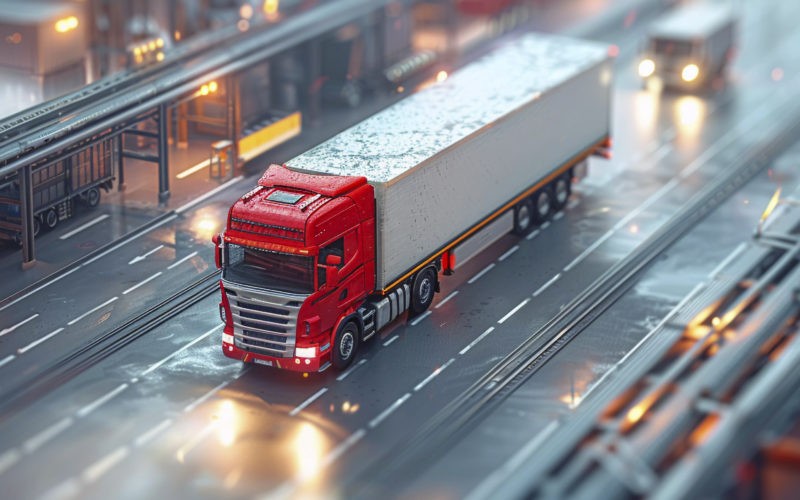A digital freight forwarder is a smart ecosystem that takes care of all logistics processes for a company in one place. Let’s see: it connects carriers and shippers using AI, blockchain, and data analytics for smooth, transparent, and eco-friendly transportation. What will make digital freight platforms essential in 2025? Let’s dive in:
- Automated booking and real-time cargo tracking.
- Dynamic pricing based on supply and demand.
- Route and congestion forecasting.
- Reduced idle mileage and lower CO₂ emissions.
These platforms streamline operations, enhance transportation efficiency, and unlock new growth opportunities with built-in cutting-edge technology. So, just try them.
What are the types of digital freight platforms?
Here are the main types of digital freight forwarding platforms you should know about:
- Marketplaces for cargo transportation: Online platforms where shippers connect directly with carriers. A fast and convenient option for moving cargo immediately, suitable for both small and large businesses.
- TMS (transportation management systems): Automate key processes like planning, monitoring, and optimizing transportation. They handle the routine work, so you can focus on managing incoming data.
- Freight exchanges: Platforms for trading freight services in real time. You get access to a variety of options and can choose what suits your needs at the moment.
- 3PL and 4PL platforms: Provide outsourced logistics with advanced analytics and optimization. A smart, cost-effective choice when you need extra resources without the hassle of hiring and training.
- Specialized platforms: They work for specific industries like agriculture or pharmaceuticals. They ensure that specialized cargo, like medical supplies or hazardous materials, is transported safely. As a rule, they have a wide expertise in various niches.
TOP 5 most popular digital freight platforms in 2025
Here are five of the most popular digital freight platforms that will shape the logistics industry in 2025.
- Convoy: An American platform that leverages AI to optimize routes and cut transportation costs. It analyzes potential disruptions and suggests ways to avoid them. Simple in use but with great value.
- Uber Freight: A fast and convenient way for shippers and carriers to connect via a mobile app. Think of it as Uber but for freight transport, designed with businesses in mind or something bigger than a tiny parcel.
- Flexport: An international platform handling everything from customs clearance to supply chain analytics. They take care of the logistics, so you only need to manage the incoming data.
- Transporeon: A European solution for transport management, covering tenders, cargo tracking, and performance analytics. It offers all essential logistics tools in one place.
- Freightos: A global marketplace for booking international freight with transparent pricing and a streamlined booking process. They work for large-scale, high-value shipments that need global coordination, not with the option to transport something small.
Pros and cons of each freight platform
Let’s quickly run through these platforms and the factors that might influence your decision.
Convoy
- Pros: Uses AI to optimize routes and cut CO₂ emissions.
- Cons: Limited availability outside the US.
Uber Freight
- Pros: Fast booking through a mobile app with transparent pricing.
- Cons: Mainly focused on the US and Europe, so options for global shipping are limited.
Flexport
- Pros: Full-service logistics, including customs clearance and detailed analytics for supply chain optimization.
- Cons: Services can be pricey for small businesses.
Transporeon
- Pros: A comprehensive logistics management system with real-time cargo tracking.
- Cons: Best suited for large companies, and the interface can be complex for new users.
Freightos
- Pros: Transparent pricing and booking of international transportation. Large selection of carriers.
- Cons: Primarily focused on corporations, with fewer options for small shippers.
How to choose the right platform for yourself?
First, think about your business needs and size. As mentioned earlier, each platform offers unique features tailored to different business scales. If you need advanced solutions, Flexport or Transporeon might be the way to go. For small businesses, Uber Freight or Convoy could be a better fit. Next, consider the geography of your shipments and the type of cargo. If you’re handling international shipments, look for a platform with global reach. For special types of cargo, choose platforms that provide the necessary tools. Finally, keep your budget in mind and opt for a platform that aligns with your financial plan.
How to implement a digital freight platform in your enterprise in 2025?
First, assess your business needs and choose the platform that best suits them. Then, get your team on board and make sure they’re familiar with the new system. Integrating the platform with other corporate systems is crucial for a smooth experience. After that, test the platform in real-world conditions and adjust based on the results. Once everything is running smoothly, keep the platform up to date to leverage the latest tech and features. And don’t forget to monitor its effectiveness to catch any issues early and keep improving.
Key benefits of digital freight platforms?
Innovative transformation involves the integration of all components of the digital world, and the use of data by becoming a key production factor. This approach allows digital freight brokers to create new business models, providing companies with serious competitive advantages both in regional and global markets. These changes can benefit any industry significantly.
The freight forwarding technology, as an innovative digital logistics product, provides an ability to create integrated transport services depending on the constantly changing needs of the client. Based on production needs, it improves the quality of service and reduces costs with the participation of various carriers in the implementation of certain transportations, and large-scale integration of intelligent communication technologies between the user, vehicle, and infrastructure required to meet the needs of the partners.
The crucial benefits of digital freight platforms involve the following factors:
Advanced customer experience. In this case, the participants in business processes can enjoy a highly-developed pricing engine, improve all digital operations including invoicing, shipment tracking, and price quotation. The creation and further usage of customer digital platforms can turn into the first step to increase the level of clients’ satisfaction and business profitability.
Continuous and efficient functioning of logistics business processes. Digital freight development provides companies with an opportunity to enjoy the easy management of big data and analytics needed to increase the effectiveness of transportations. The new options of the digital system turn into a basis for the creation of the strong connection between customer portal and operational systems for their productive functioning. Innovative technologies allow specialists to automate forecasting, booking, and direct deliveries while reducing errors
Conclusions
There are a lot of freight platforms out there today. As a business, it’s important to really assess your needs and capabilities to make sure the platform you choose works for you and helps you run your operations smoothly and successfully.












